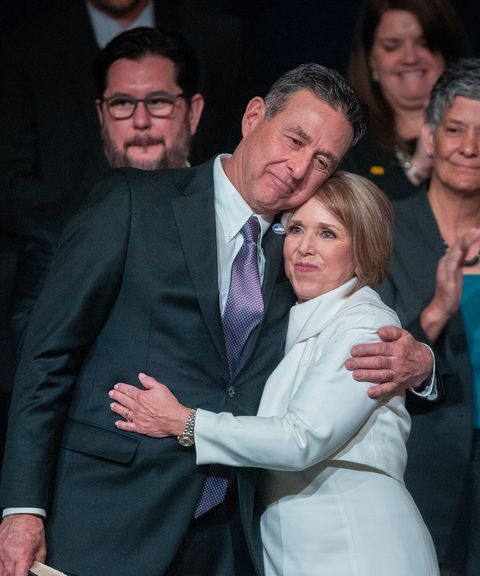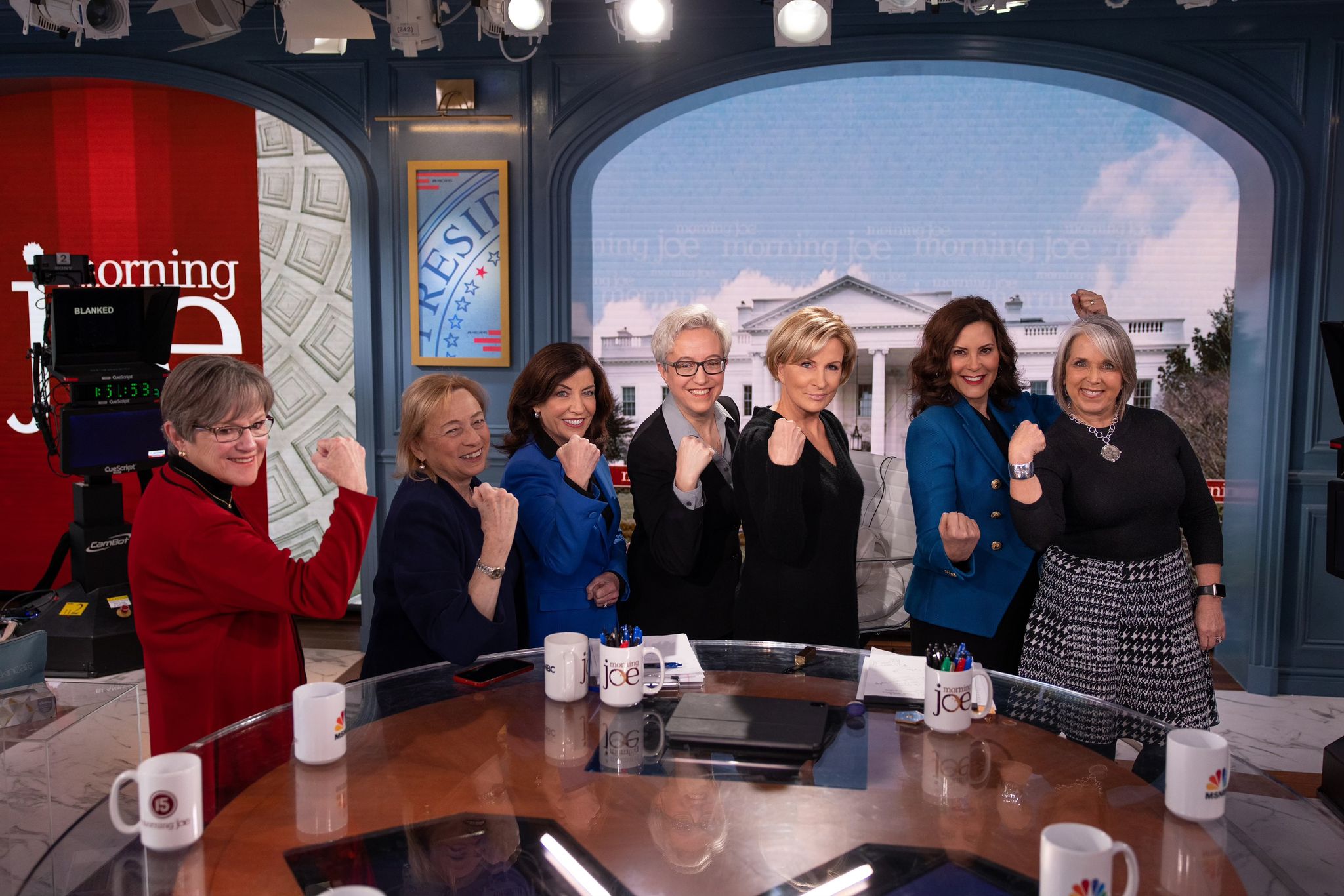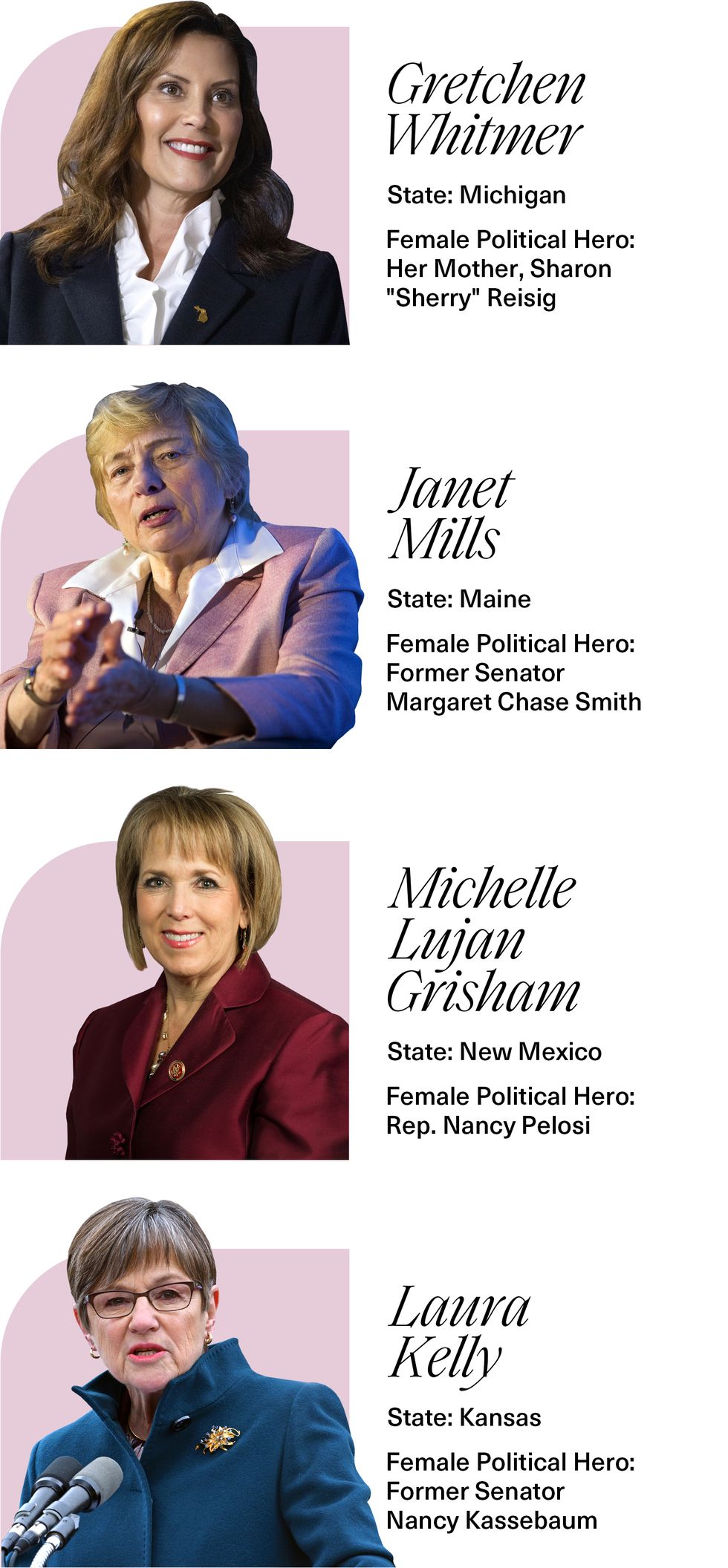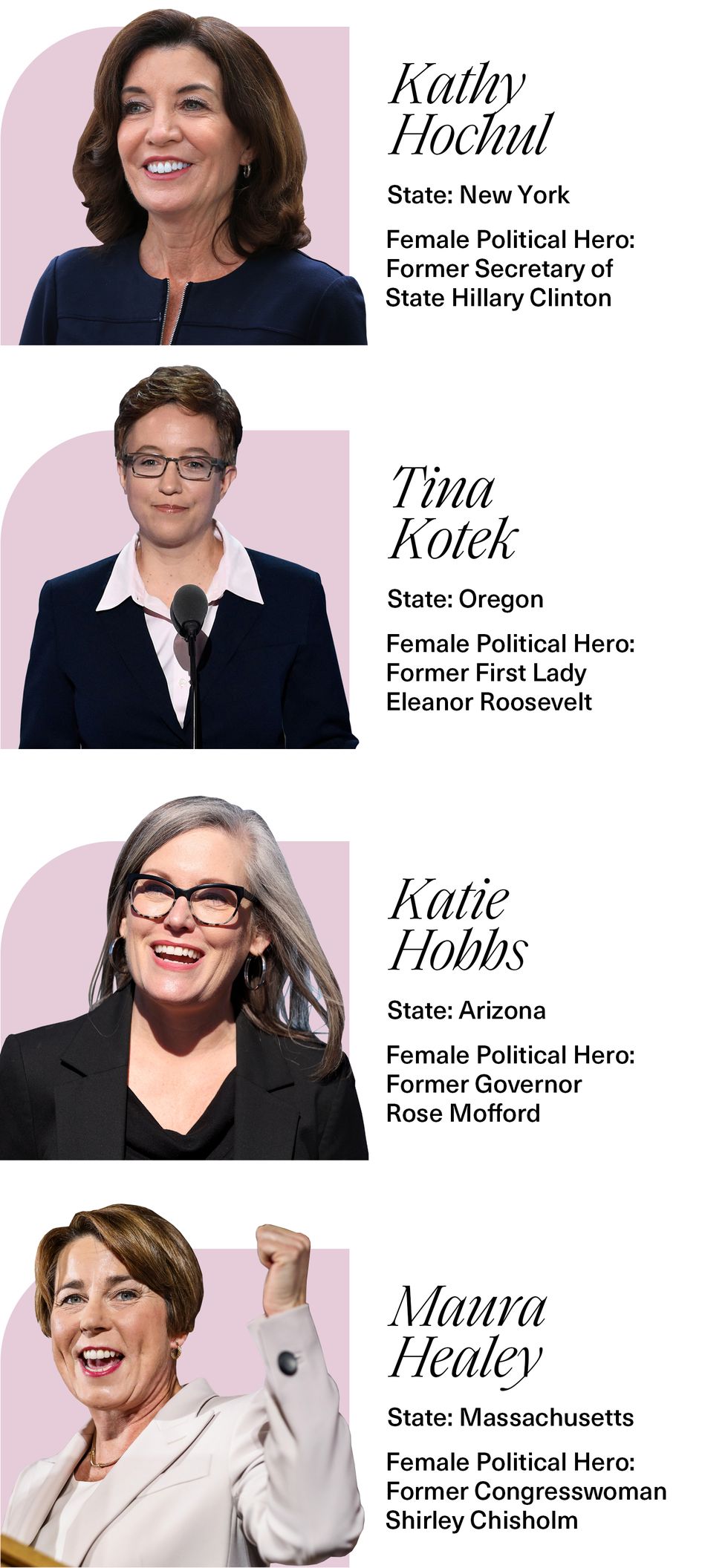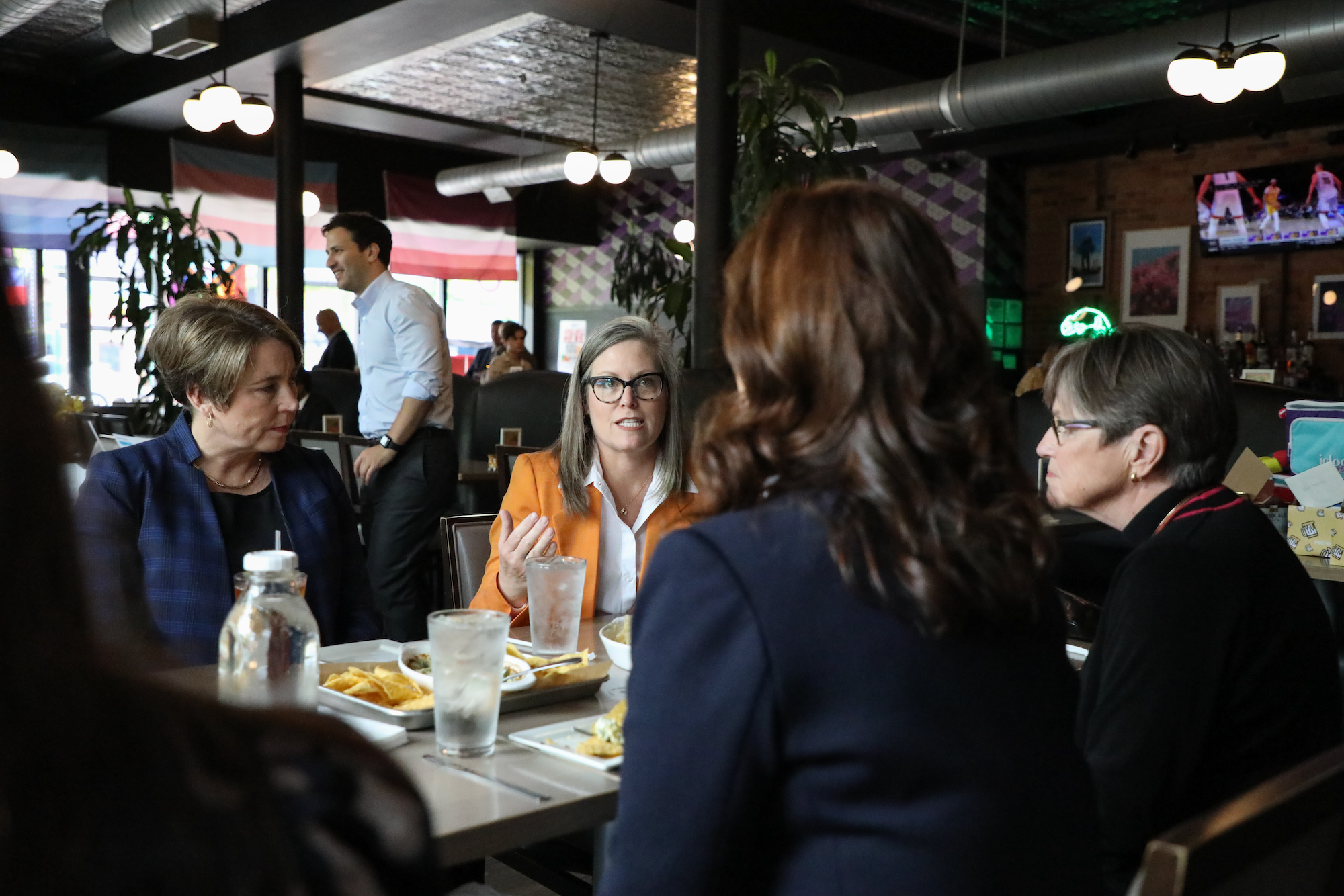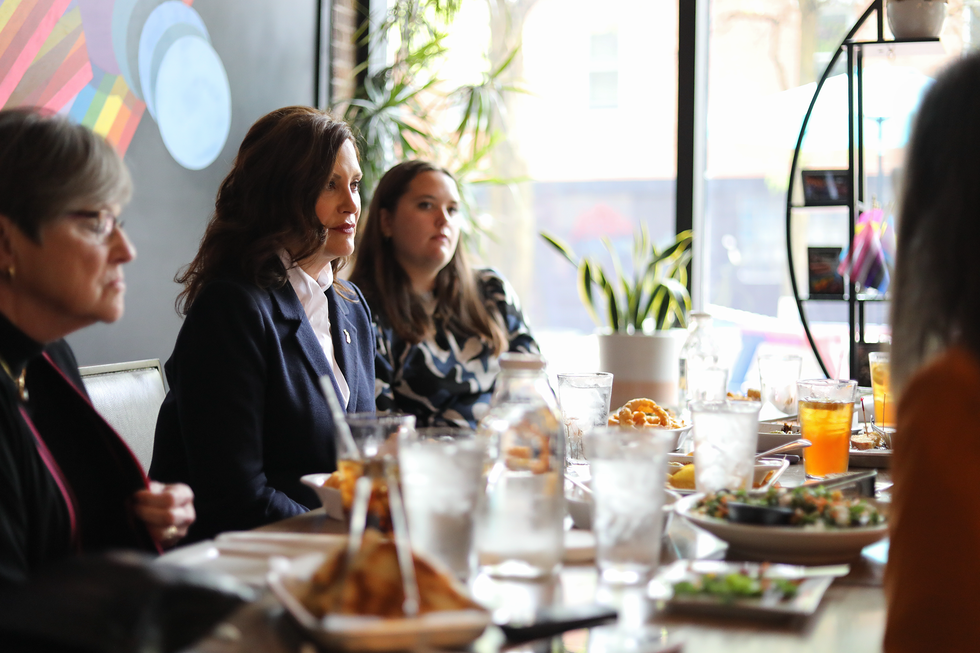Look, no one likes to upstage a bride. But when New Mexico Gov. Michelle Lujan Grisham married her longtime partner in May 2022 on a hotter-than-average day in Washington, D.C., eyes were trained on the powerhouse lineup of politicians at her side: the ceremony’s officiant, Vice President Kamala Harris, and her bridesmaids, Michigan Gov. Gretchen Whitmer, Kansas Gov. Laura Kelly, Maine Gov. Janet Mills, and then-governor of Oregon, Kate Brown.
The bridesmaids came equipped with the staples—bouquets and personalized toasts—though instead of standard, candy-colored dresses, the governors plotted to wear something a little more distinguished. “Michelle had an outfit picked out, and Laura and I conspired and vetoed it,” Whitmer says during a group governors’ lunch in Ypsilanti, Michigan this past May. “We just decided we needed to maintain our dignity,” Kelly jokes, the two falling into laughter. “We were all on the ballot too,” Whitmer adds. “We were like, no.” In the end, with the bride’s approval, they chose a uniform of champagne-colored shirts and black suits.
On the phone a few weeks after the lunch, Lujan Grisham maintains that the whole governors-as-bridesmaids thing started as a joke, a suggestion she threw out during a group dinner one night. But quickly, that joke turned into reality, and it became clear they’d been the perfect choice all along.
When the wedding weekend came, the governors were elbows deep in work; in the chaos, one of her bridesmaids could only find a long-sleeved shirt. It was far too hot for that, so she cut the sleeves off in the Vice President’s house. “They made the time and supported me in a really important, personal moment,” Lujan Grisham says. “It’s something I’ll never forget.”
In the United States, it’s still rare to find a female governor, and for the handful that win their state’s highest office, banding together can be essential. At the time of Lujan Grisham’s wedding, there were only six female Democratic governors nationwide, including New York Gov. Kathy Hochul, who was sworn in mid-2021. After the 2022 midterms, Brown left office, because she was term-limited, but three more women joined the ranks, bringing the group to a historic eight. Across the country, there are now a record-breaking 12 female governors total; Republicans Sarah Huckabee Sanders, Kay Ivey, Kristi Noem, and Kimberly Reynolds round out the group.
Most days, the Democratic governors are spread out, commanding their states, working with legislatures, and fighting back against those who are still loath to see a woman in charge. But as the few to hold these unique positions, they insist that the bond they share with one another isn’t a bonus—it’s another critical part of the job.
Take their origin story, for instance. When asked how their friendship first started, Kelly deadpans that it grew “out of true desperation.” “You walk into a pretty much all-male group, and the first thing you’re going to do is gravitate toward one of your own,” she says, picking between plates of sandwiches and tater tots at Bobcat Bonnie’s, a LGBTQ-owned gastropub in downtown Ypsilanti. At the table, she’s joined by Whitmer, Arizona Gov. Katie Hobbs, and Massachusetts Gov. Maura Healey, who are all in town for a Democratic Governors Association policy conference. Since 2018, the DGA has invested more than $80 million electing this class of female Democratic governors, and DGA events are a space for the women to hang out and be together.
Whenever possible, the governors make time for a meal or a quick walk-and-talk—they also have a group text chat for when they’re long distance—and at this lunch, their rapport is easy and light. At one point, when Healey has to leave early to catch a plane, she points at Hobbs and her plate covered in salad and exclaims: “Look at who’s healthy though. Can you tell she’s the marathon runner?” (Hobbs quickly clarifies she’s never actually run a marathon; though, she has competed in triathlons.) They might not know exactly how old everyone is or how old their kids are—the details you could easily rattle off about your best friends—but they know the most important thing: what it’s like to carry the weight of a state on your shoulders.
Hobbs, Healey, and Oregon Gov. Tina Kotek are the relative newcomers; all three started their terms in 2023, and Healey and Kotek both made history as the nation’s first openly lesbian governors. Though they weren’t necessarily strangers beforehand—Mills mentions that she and Healey became friends when they were each attorneys general of their states—Lujan Grisham says the incumbent governors welcomed the newly-elected leaders into the fold. “This sort of connectedness we’ve created, we immediately extended it to the new Democratic women governors,” she says. After all, the rest of the crew knows how essential it is to have one another in case of emergency.
“The pandemic really solidified these relationships,” Kelly explains. “We needed each other, for not only emotional support but for how to get things done.” Whitmer adds: “We really were helping one another with logistics, troubleshooting, gut checks. We were all building 50 airplanes while we were flying them, when lives were on the line.”
During COVID-era governors’ calls with Donald Trump’s White House, they’d have a real-time group chat going on the side. “To say, ‘Am I hearing this right?’” Whitmer says. “‘Did he really just say that?’” Kelly adds. Having somewhere to turn proved invaluable. “These relationships are important in any time,” Whitmer says. “But especially in times of crisis, to have people whose judgment you trust.” Plus, Mills echoes, it was an emotional time: “Yet as leaders, you’re not supposed to show emotion,” she notes. Even when violence comes to your door.
Early in the pandemic, Whitmer’s star was on the rise as her response to COVID-19 garnered praise from across the country; she was reported to be on Joe Biden’s list of potential running mates. But then-President Trump was criticizing her publicly, calling her “the woman in Michigan” and tweeting that she was “way in over her head, she doesn’t have a clue.” After Whitmer imposed a stay-at-home order to curb the virus, right-wing protesters arrived at the state capitol yelling, “Lock her up,” and in October 2020, six men were charged with conspiring to kidnap her. During a press conference after the indictment, Whitmer said: “When I put my hand on the Bible and took the oath of office 22 months ago, I knew this job would be hard. But I’ll be honest, I never could have imagined anything like this.”
Now, a few years later, Mills says the situation was “pretty frightening” to watch, and Whitmer notes she had a lot of colleagues check in when everything became public. Throughout our conversations, nearly every governor references the incident—a horrifying example of what this job can entail—though as Kelly points out, during the pandemic, they were all “under watch.” “You often find [ultra-right conservatives] believe women have their place, and it’s not in the governor’s office,” Kelly says. “That came out very strongly during the pandemic when we had to be very public, tons of press conferences. We were clearly in charge, and I think that made people react more strongly—seeing a woman up there, telling them what to do.”
And broadly, when female politicians are attacked, Hobbs adds, she finds it tends to be more personal, more virulent. Hobbs was Arizona’s secretary of state during the 2020 presidential election, and when Trump falsely claimed the election had been stolen, Hobbs and a number of other public officials were threatened and harassed. “I hear with male politicians that it’s directed at their female family members,” she says. She saw Georgia Secretary of State Brad Raffensperger getting attacked like she was, but a lot of the vitriol was directed at his wife and family. By contrast, Kelly adds: “They never mention my husband.”
It’s a harrowing reality—and a clear deterrent for women entering politics—but to go through it alone? “I was really sad when I saw the Prime Minister of New Zealand Jacinda Ardern resign,” Whitmer says. “I think her experience was much like ours, and I’m grateful she stayed in it as long as she did. But I’m sure every one of us has had our moments where we thought, ‘God I’m doing the best I can to keep people alive, and some are trying to kill me. What am I doing?’ This camaraderie, it keeps you going.”
It’s also ultimately why their friendship is so important, not just for them, but for anyone who wishes to see parity across politics. Having a record 12 female governors might be history-making, but it’s also a disappointingly small group—with a drastic lack of racial diversity—and it can’t increase if those in leadership don’t feel supported.
For Hobbs, the connection proved especially helpful during her campaign, when she ran against Kari Lake, a far-right, Trump-endorsed Republican candidate who denied the results of the 2020 presidential election and later refused to concede her own election. Hobbs vs. Lake was one of several gubernatorial races across the country where two women were up against each other, though Hobbs notes, “maybe the most dangerous woman in America was running against me.”
Throughout the race, Hobbs faced a lot of controversy after she refused to debate Lake, explaining that she didn’t want to participate in a conversation where Lake would “shout over” her and spread lies about the 2020 election. “A lot of people were frustrated with me, because I didn’t adopt her approach to campaigning,” Hobbs says now. “It was really hard taking all those attacks, not just from the outside, but [from] people who are supposed to be supporting you. There were a couple times I ran into [Healey]…and Gretchen checked in with me all the time, and it was really helpful. I knew I was coming into a special group.”
Healey agrees; for her, it’s been game-changing to have mentors and role models she can rely on, people who’ve run this gauntlet before. “I feel so lucky to walk into this room of governors and have people like Gretchen and Laura there,” she says, recalling how she once called Whitmer during her early days in office to get advice on whether to call in the National Guard. “There are just very few of us, and it comes with a different set of experiences. We’re caregivers or mothers or aunts or managing households in addition to managing governments. It’s just really helpful to be able to pick up the phone and not only talk important issues of substance and policy, but also life as a female politician is its own exercise.”
Even their kids have gotten in on the sisterhood. Sherry, Whitmer’s college-aged daughter who tagged along to the Ypsilanti lunch, once had dinner with Hochul’s daughter, Katie, and chatted about what it’s like to be a governor’s kid. “It was really interesting to talk about the hate our moms get,” Sherry says. “I talked about Mackinac [Island, where the Michigan governor has a summer residence], like, oh that’s a perk you get, and Katie was kind of jealous,” she jokes. “It’s really nice to actually get to know somebody who’s in that situation.”
And while it might seem obvious that a group like this would lean on each other, Lujan Grisham explains that, given their ultimate career goals, it’s actually the opposite: “Governors run for president, so it’s not always a natural collegial fit, because you’re going to compete potentially,” she explains. “What binds us is the powerful effort at making incredible differences in our states and communities and wanting the same success for each other.”
They say watching a female colleague “own her space” and “take on a fight,” as Whitmer puts it, doesn’t create a platform for rivalry. It instead creates an opportunity for all of them to feel comfortable doing the same. Whitmer points to a few times the other governors’ grit has inspired her, like in 2021, when Kelly promoted axing the state’s sales tax on food, all while holding an actual ax, or when Hobbs was “staring down” people who tried to undermine the 2020 election. Healey says she felt courageous watching Kelly veto anti-LGBTQ legislation in Kansas and seeing Whitmer protect workers’ rights and reproductive health care in Michigan. “I’m really proud to be amongst their ranks,” Whitmer says. “And I’m cognizant it’s my duty to make sure they feel the same way.”
The hope is that, eventually, other women will see their successes and run for office too—and their “state executive sorority,” as the Democratic governors once called it, will grow. “I am more hopeful than ever,” Lujan Grisham says. “More women governors, more women in the White House, as president, maybe a double ticket—that’s coming, and it’s these relationships that are building toward that future.”
Madison is the digital deputy editor at ELLE, where she also covers news, politics, and culture. If she’s not online, she’s probably napping or trying not to fall while rock climbing.

